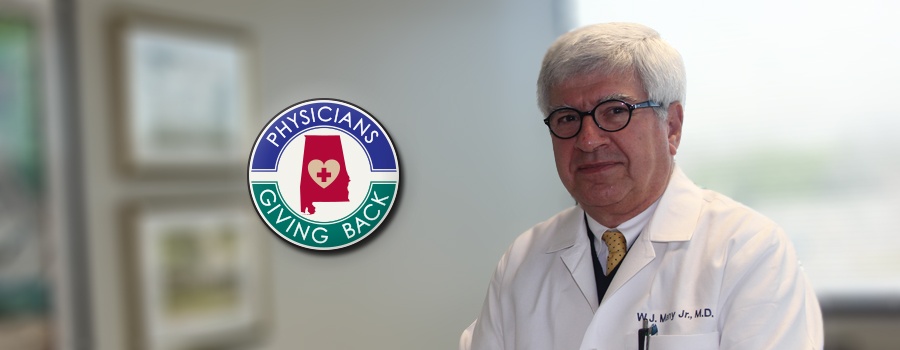MONTGOMERY — He jokes about it now, but Wick Many, M.D., said he was a sickly child who spent a lot of time in his pediatrician’s office. For those times when he was too sick, his doctor would make house calls…an experience he did not look forward to.
“Back then, in the 1950s, pediatricians would come out to your house at the end of the day. They would spend all day in their clinics seeing children, but then for those who were really sick, they would make house calls. I was scared to death!” Dr. Many laughed. “The doctor would come in with his big brown doctor’s bag, and that usually meant I was going to get a shot of something. That was my first recollection of medicine.”
Dr. Many grew up around medicine. A native of New Orleans, his mother was the paging operator at what was then the Southern Baptist Hospital of New Orleans. Because she worked night or evening shifts and couldn’t come home for dinner, family dinners were often taken on the ER ramp.
“No one in my family had a medical background, but at some point in high school, I decided this was what I wanted to do. I didn’t have an A-HA moment or an epiphany, it’s just what I knew I wanted to do,” Dr. Many said.
Although he went to LSU for his undergraduate degree, he intended to stay close to home for medical school until a friend who was accepted to UAB talked him into joining him in Birmingham. Once convinced of UAB’s credibility as a medical school, he had to convince his colleagues back home in Louisiana.
“This was the late 1960s, and my colleagues who were at LSU just didn’t understand,” Dr. Many explained. “Alabama? Birmingham? What? They just didn’t get it. I stayed at UAB for the rest of my time except for a year when I went to Dallas. I’ve been affiliated with UAB in some way, shape or form since 1980.”
Although trained in infectious disease, there came a time when Dr. Many’s marketing skills were put to the test when he was approached with an opportunity to step into the spotlight and bring some publicity to the UAB School of Medicine Montgomery Regional Medical Campus.
WSFA-12 had run a syndicated medical segment for years with Houston’s Dr. James “Red” Duke, Jr. When that syndication ended, Dr. Many stepped in, not only to provide helpful medical information to viewers but also for the sake of the Montgomery UAB campus.
“Even to this day – TO THIS DAY – there are a lot of people who do not know there is a residency program and a branch campus here in Montgomery,” Dr. Many said. “I can still go to the bank or the post office and folks will ask me if I drive down from Birmingham every day, and I have to tell them no, no, no. UAB has been in Montgomery since 1978, but the majority of the people here in the region still don’t know that. We haven’t done a lot of advertising or marketing because we haven’t had the funding for it.”
As dean of medicine for the UAB School of Medicine Montgomery Regional Medical Campus, Dr. Many is responsible for about 40 medical students, roughly 20 third-year and 20 fourth-year students. There’s still much room to grow, but Dr. Many said the Montgomery campus is unique considering the resources he and his staff utilize to give the students a well-rounded medical education. For example, in the eight weeks students spend working in the family medicine “block,” four of those weeks are spent in Montgomery with another four in Selma. Part of the time spent in Selma is then spent in Marion with the idea that each step further removes the students from what they have become accustomed to in medical school.
“The purpose of that is to give them an appreciation of not only the opportunities of practicing in a rural setting but also the challenges so that in the future if they decide not to do that they have a better appreciation for what family physicians in that position actually do. I call it ‘intellectual isolation.’ Everyone likes to share stories. If you’re a solo practitioner in a very small town, and you have a patient that comes to you with something weird that you haven’t seen since medical school, who do you talk to? Physicians in more metropolitan areas are fortunate because we have grand rounds, lectures, and of course the Internet has made a difference, but in the most rural of our communities, we don’t have these things,” Dr. Many said.
The Montgomery campus also utilizes resources unique to Montgomery for special teaching opportunities. Representatives from the Medical Association of the State of Alabama, the Alabama Board of Medical Examiners, the Alabama Department of Public Health, the state forensics lab, military physicians and representatives from the Montgomery Police Department all have a special take on medicine that can’t be taught in the classroom but aspects of medicine that new physicians need to understand.
Considering all his contributions to the medical landscape in the River Region and to UAB, it’s difficult to picture medicine without Dr. Many. But in his junior year in college, he also took a different path.
“I came very close to changing my major to history my junior year in college,” Dr. Many said. “If I wasn’t a physician, I’d be a college history professor. I love to read, but I don’t read fiction. I read biographies of our presidents and historical figures. My favorite book is the biography of Alexander Hamilton. He has to this day had an impact on our country. He created the financial system of the United States yet he had so many flaws. Fascinating!”
